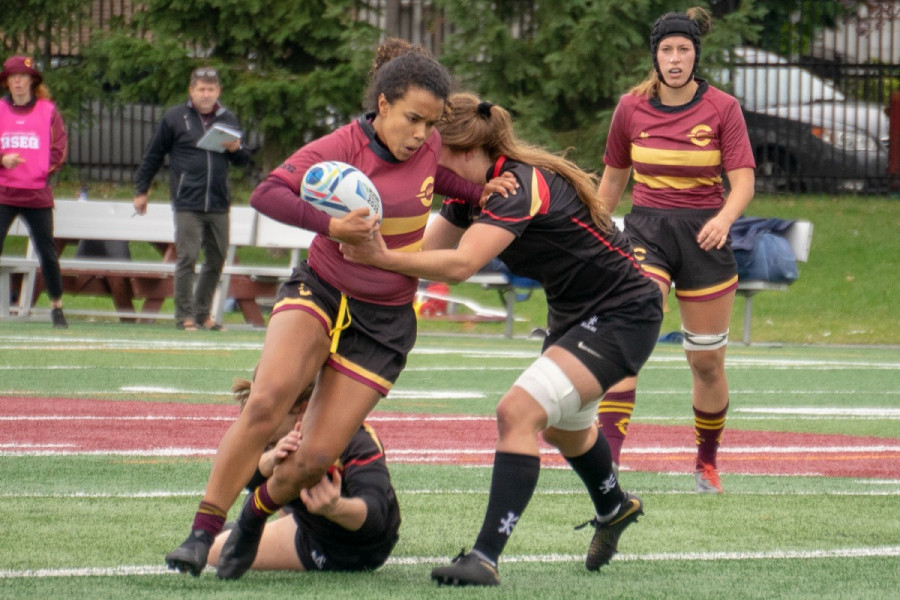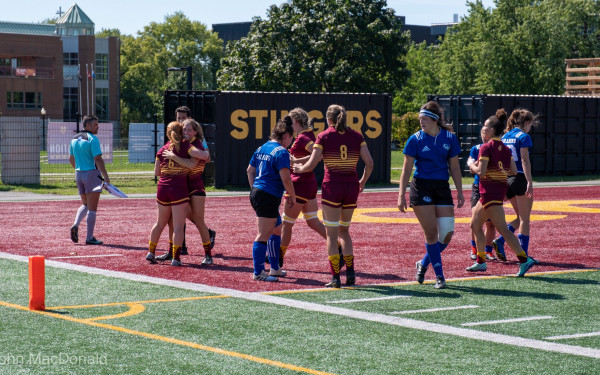Stepping Onto the World Stage
Jasmine Baxter Solidifies Spot on Women’s Under-20 Canadian National Rugby Team
At a late-April selection camp for the Women’s Under-20 Canadian National Rugby team in the small lakeside Village of Shawinigan, British Columbia, Jasmine Baxter engaged in pre-camp introductions and blunted her nervous energy.
As she stuck close to the small number of players that she had recognized from her home region of Southern Ontario, Baxter believed the camp “started off easier and got harder as the camp progressed.”
Despite the introductions being preceded by arduous fitness testing, meticulous skill work, and brutal tackling exercises, her tri-weekly offseason skills and weight training program had prepared her for the challenge.
After the camp, Baxter remained on picturesque Vancouver Island for the Next Gen Langford Sevens Tournament before she returned to Ajax, Ontario to await the coaching staff’s roster selections.
A Women’s Under-20 roster spot is a critical stepping-stone for athletes who wish to pursue a career in rugby. Those who make the team will earn an opportunity to play at the 2019 Tri-Nations Cup.
This year, Loughborough, England hosts the second-year event that includes teams from Canada, England, and the United States.
According to the Canadian under-20 assistant coach Jocelyn Barrieau, who is also the head coach of the Concordia Stingers Women’s Rugby team, the event offers its athletes “an opportunity to excel and travel, and just be in that day-to-day kind of tournament environment.”
Consequently, the environment present at the Tri-Nations Cup is paramount to the development of athletes who wish to play on the Senior Women’s Fifteens team at the World Cup of Rugby.
For the coaches of the under-20 team, their goal is clear: identify and develop outstanding athletes who can represent Canada on rugby’s biggest stage.
Baxter exceeds this criterion, as a gifted athlete whose presence and trademark “Jas face”—a piercing stare that betrays her relative inexperience—command the respect of her teammates and strike fear into the hearts of her opponents.
Baxter’s teammates praise her style of play, and Emma Gallagher, who regularly plays in tandem with Baxter suggests that Baxter’s “first step” enables her ankle-breaking jukes.
Baxter incinerates her competition, and in RSEQ play this past season, she totalled 39 points through seven games, which tied her at the top of the Stingers roster with fellow all-star, Shawna Brayton.
Accordingly, it should come as no surprise that in early June, roughly one month after returning home from the selection camp, Baxter received an invitation to represent Canada at the Tri-Nations Cup.
Baxter’s success emanates from a Stingers program that is in a rebuilding phase under second-year head coach, Jocelyn Barrieau. In her short tenure, Barrieau’s impact emerges in any interaction that one might have with the members of her team. Her players embody strength, confidence, and wisdom.
Gallagher had planned on playing a single season at Concordia and credits the environment enveloping the team for her decision to play a second year, stating, “I improved so much just in, you know, preseason, through the postseason, and it was an environment like I said, that I wanted to be in because we love each other.”
University professors who study collective action problems continually praise deliberative methods of problem-solving, and on a micro-scale Barrieau has weaved these methods into her team’s operations.
Specifically, Barrieau breaks the team into small groups that collectively assess previous matches. Barrieau says that the point of these sessions is “to create strong future leaders who can present and, you know, have reasons for what they believe in and, and prove it with video.”
Barrieau has created a microenvironment that is an example of how society could function and a culture that shapes her players into robust individuals who are ready to make their mark on the world.
The Fight for Equality
This production of influential individuals comes in the context of persistent gender inequality. Issues involving unequal funding and distributions of power have marred Rugby Canada’s reputation and caused uproars across Canada.
In 2011, Rugby Canada forced the women on the senior fifteens team to pay to play; whereas, in the same year, the Senior Men’s Fifteens team received 1.8 million dollars worth of funding. Currently, the Canadian national women’s teams are excelling, and while World Rugby ranks the Senior Women’s Fifteens team third and the men’s team twenty-first, the men continually receive more funding.
Furthermore, in 2018, Rugby Canada announced a plan to increase youth rugby registration fees to fund the Senior Men’s Fifteens team exclusively. Unequal funding continually tarnishes Rugby Canada’s reputation, and while the organization has committed to a gender balance among its board of directors that is no less than forty percent female, inequality persists. Society requires influential leaders whose character is shaped in positive social environments.
Jasmine Baxter is a budding superstar who is primed to excel on the world stage. When asked about her goals for the tournament, Baxter expresses that she wants to “learn some stuff from some different coaches, get better, and hopefully be able to play seniors.” Baxter is methodically approaching her challenges and building her rugby acumen.
Baxter comes from a Stingers program that is run by a coach who understands the importance of building impactful and courageous leaders who can excel in realms beyond rugby. Not every Stinger will play for a Canadian national team, and not every player will fill slowly opening leadership roles, yet the skills that Barrieau imparts on her athletes are assets to the players and society at large.
Loughborough, England hosts the Tri-Nations cup from July 20-28, 2019. Canada will play the United States on Wednesday, July 24, at 11:00 a.m. ET and face England on Sunday, July 28 at 11:00 a.m. ET.





(3of3)_600_375_90_s_c1.jpg)
_600_375_90_s_c1.jpg)
ConUvsUBC(6)_600_375_90_s_c1.jpg)